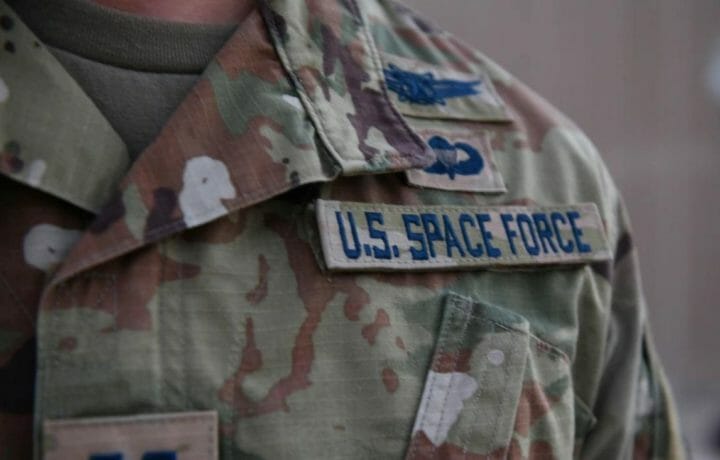United States Space Force Guardians will soon have the option between full-time and part-time active-duty service as part of the 2024 National Defense Authorization Act signed into law by President Joe Biden. The new Space Force Personnel Management Act will now offer active-duty Guardians and Air Force reservists working on space-related missions the option to serve either full time or part time.
However, the sixth and newest branch of the United States military won’t have a National Guard component.
Instead, the U.S. Space Force is adopting a unique vision that is meant to address the modern American workforce. As the other services struggle to meet recruiting goals, the Space Force now seeks to retain its skilled service members who may otherwise by tempted by higher-paying civilian jobs.
In addition, the part-time option could further entice civilians in the private sector to consider military service. The United States Space Force and the United States Marine Corps – the smallest branches of the military – were the only ones to meet their recruiting target goals for fiscal year 2023 (FY23).
The Space Force has also announced plans to grow its uniformed force to 9,400 guardians by the end of this coming September.
One Service – Multiple Options
The other branches of the U.S. military traditionally separate the active duty from those in Reserve or Guard units, but the Space Force hopes to provide greater flexibility for those looking to serve their country and in the process keep them in uniform longer.
“When fully implemented, this new construct will allow us to manage our military force more effectively, improve quality of life and retention, and capitalize on skill sets developed outside the military to continue delivering unmatched space capabilities,” Maj. Tanya Downsworth, a Space Force spokesperson, told Military Times via email last week.
According to the 2024 NDAA, those on active duty in the United States Space Force will become classified as serving on “sustained duty,” or as regular, full-time status; or as “not on sustained duty,” which would designate a part-time position.
Those part-timers will still be required to participate in at least 48 scheduled drills or training periods each year, and serve on active duty for at least 14 days per year – excluding travel time – or serve on active duty for training for up to 30 days each year, according to the law. The 2024 NDAA further established the designation of “inactive status” for guardians, which would be similar to the Individual Ready Reserve status that already exists in Air Force as an additional pool of people who can be called up in an emergency. Those service members would not receive pay and would not be required to drill unless called upon to so, or if they volunteer to return to the active-duty force.
However, there will be hurdles to clear to make this happen.
The Space Force will still need to determine how the new legislation will become a reality for the uniformed guardians as well as the 1,000 or so Air Force Reservists in space-related jobs. The phased implementation could take at least five years.
Questions such as what benefits will part-timers have, and how they will be promoted and selected also need to be address.
The 2024 NDAA called upon the Department of Defense to “conduct an independent study to assess the feasibility and advisability of moving all units, personnel billets, equipment, and resources performing core space functions under the operational control of the Space Force, or otherwise integral to the Space Force mission that may exist in the National Guard … into a single-component Space Force.”
That report is due by Feb.1, 2025.
National Guard Guardians?
Critics maintain that the Space Force doesn’t need the added cost or the logistical challenges that come with a new National Guard component. There are currently nearly 1,000 National Guard soldiers and airmen who perform space-related operations across more than a dozen units in seven states and one U.S. territory. Those individuals manage missile warning systems, maintain systems that counter electromagnetic attacks and work with military communications satellites, and perform other missions.
However, Air Force Brig. Gen. Mike Bruno, the chair of the space task force at the National Guard Association of the United States, believes otherwise. He told the Federal News Network that a Space National Guard could leverage the National Guard’s existing state partnership program to advance the space capabilities of foreign militaries.
“You could also have a Space National Guard, which would be your surge to war capability,” Bruno added. “We are already doing that surge toward capability supporting combat commanders. So that would give you that capability so they could both function together. And that’s our hope is that’s what happens.”




